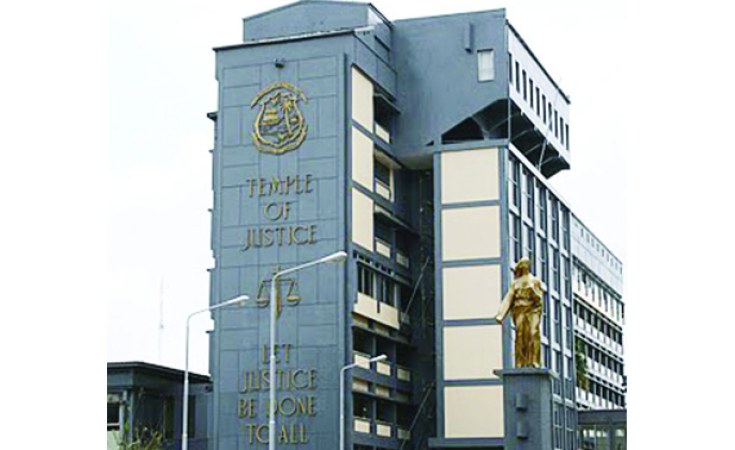Former Senator Commany B. Wesseh (River Gee County) says Liberia does not need a war crimes court but rather a South African style of truth and reconciliation.
He is vehemently opposed to calls for the establishment of a war crimes court for Liberia because such calls run contrary to the Compressive Peace Accord signed in Accra, Ghana, by the Liberian warring factions in 2003.
Senator Wesseh, an elderly statesman and stalwart of the now-ruling Unity Party, explains that witnesses, including Liberians and international signatories to the Comprehensive Peace Agreement, assured warring factions and the entire world that only a South African type of truth and reconciliation was necessary for the country.
Speaking to reporters in Monrovia, Senator Wesseh notes that August this year marks exactly 21 years since the peace accord was signed in Ghana, so there's no reason why people should demand the establishment of the court.
On March 5, 2024, about 42 out of 73 members of the House of Representatives endorsed a resolution for the establishment of a war and economic crimes court for Liberia to prosecute perpetrators of the country's 14-year civil war.
The action coincided with the visit of the U.S. Ambassador-at-Large for Global Criminal Justice, Beth Van Schaack, who has met with Liberian legislators, including sponsors of the proposed legislation.
The legislation has been forwarded to the Senate for its action.
The Speaker of the House of Representatives, J. Fonati Koffa, has dismissed reports that the court will be sitting in Ghana.
But reacting to the House's recent decision, the former senator points out that in the CPA, one of the issues they debated in session for a longer time was whether or not there should be a war crimes court set up in Liberia or the alternative, which is truth and reconciliation.
According to him, the agreement set forth during the peace agreement gives rise to the Truth and Reconciliation Commission (TRC), adding that it was agreed upon that the TRC shall be established to provide a forum to address impunity issues.
He says such a forum provided an opportunity for both victims and perpetrators of human rights violations to share their experiences as was agreed instead of a war crimes court.
Mr. Wesseh: "We shouldn't do anything that will disrupt what was agreed to and which has worked so well for 21 years."
He notes that what appears to be a problem now is that some things that happened several years back, including the Coup d'etat of 1980, which subsequently led to the brutal civil war, are still manifesting.
He narrates that the reoccurrence of those things means there should be a mechanism put in place to ensure that those things that appear to be reemerging will stop, adding that there are already courts in the country that say if you murder anyone, you will be tried, and this is exactly what those courts have been doing.
The aging Liberian progressive maintains that Liberia does not need a war crimes court to prosecute all those massacres, and deaths that have taken place in the last six years or more don't even require such a court either.
Rather, he stresses a need to investigate how auditors were killed, saying, "You can't claim those people had so-called accident for which some jump over the window, or found dead in their vehicle."
He expresses frustrations that there has been no proper investigation since those incidents, and these are things that need serious attention, not war crimes court.
"The police, the army, everyone knowing their roles, those are the things in my view that need to be perfect and emphasized, not war crimes court"
The ex-senator's view seems to come as a slap in the face of proponents of a war and economic crimes court for Liberia, especially when international partners, particularly the United States, have expressed willingness to finance such a court.
U.S. Ambassador-at-Large for Global Criminal Justice Beth Van Schaack is leading the campaign here, urging citizens to support calls for the establishment of a War and Economic Crimes Court for the country.
President Joseph Boakai publicly announced his support for the court during his inaugural address in January and has held a conference with Dr. Alan White, former chief investigator of the UN-backed Special Court of Sierra Leone.
In a recent article posted on the official website of the Embassy of the United States near Monrovia, Ambassador Van Schaack underscores the critical importance of citizens' engagement in pursuing justice and healing the wounds of the past.
According to her, the decision to ultimately establish a war and economic crimes court solely rests with the Liberian people, and the TRC's findings have already set the stage for that.
"It is not my opinion that matters," she stated, emphasizing the need for Liberians to take ownership of their history and request for the establishment of the court to prosecute perpetrators of war crimes.
Her call to action comes in response to recommendations laid out by Liberia's Truth and Reconciliation Commission (TRC), which has advocated for establishing a war and economic crimes court.


